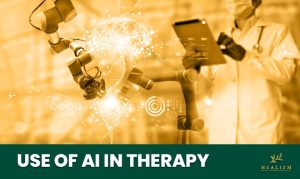
As the world becomes more technology-driven, mental health professionals are exploring new ways to support people mentally. One of the latest innovations in mental health treatment is AI therapy, also known as artificial intelligence therapy. AI is a cognitive-behavioral therapy (CBT) that uses artificial intelligence to help people improve their mental health. People can receive personalized guidance and support anytime and anywhere with AI therapy. This blog post will delve into AI therapy’s benefits, disadvantages and potential issues.
What is AI Therapy?
AI therapy is a cognitive-behavioral therapy that uses an artificial intelligence algorithm instead of a traditional therapist to guide individuals through the therapeutic process. AI therapists work with natural language processing technology to interpret conversations and identify patterns in behavior that may affect an individual’s mental health. Once the AI has analyzed these conversations, it can make recommendations to help people achieve desired outcomes or goals, such as suggesting coping strategies or exercises according to their specific needs and circumstances. AI therapists can track progress over time and personalize interventions to enhance outcomes.
AI Therapy: How It Works & How It Helps With Mental Health
AI therapy works through complex algorithms, natural language processing (NLP), machine learning (ML), deep learning (DL), and personalized interventions. AI therapists analyze conversations, track progress over time, and provide helpful feedback to help individuals reach their desired goals.
Woebot, Wysa, Tess, and Ginger.io are examples of AI therapy solutions that use different algorithms to offer personalized interventions.
Studies indicate that people with mental health challenges are highly satisfied with AI chatbot therapy.
Understanding the Difference between AI-Based and AI-Assisted Therapy
AI-based therapy completely relies on artificial intelligence to provide therapy, while AI-assisted therapy combines traditional psychotherapy techniques with AI technology to deliver personalized interventions. In AI-based therapy, patients interact with a computer algorithm or machine learning model to receive tailored advice or treatment. A qualified professional works alongside AI tools and algorithms to enhance the therapeutic process in AI-assisted therapy.
Benefits & Disadvantages of AI Therapy
Benefits
- AI therapy has the potential to make therapy more accessible and affordable for people who may not have access to traditional forms of therapy.
- It allows for greater privacy and convenience, as people can access it from anywhere at any time.
- AI therapists can make individuals feel more comfortable sharing embarrassing details, which is especially important for those who feel shame or stigma in face-to-face interactions.
- People feel at ease to open up more.
- AI therapy also provides personalized interventions and feedback to help people reach their goals.
Disadvantages
- There are a few potential disadvantages of AI therapy – because the algorithms used to interpret conversations and suggest interventions are still being developed, they may not be as accurate as traditional forms of therapy.
- Additionally, AI therapies lack human interaction, which can be an important part of the therapeutic process for some people.
- There may be ethical concerns about using AI-based therapies, as some people may feel uncomfortable with the idea of an algorithm “reading” their thoughts or conversations.
Considerations & Concerns
There are potential ethical considerations associated with AI therapy, such as issues of privacy and the potential for bias in algorithms. Who bears the responsibility for advice provided by an AI therapist based on a person’s conversations and circumstances, and is it ethically justifiable?
Many people still prefer the in-person connection and rapport with a live mental health professional, and AI therapy should be seen as a supplement to, rather than a replacement for, traditional therapy.
Conclusion
AI therapy has the potential to revolutionize mental health care and provide affordable, convenient options for those seeking help. However, it’s important to understand the potential risks and ethical issues involved before engaging in AI therapy.
It’s important to consider that AI therapists may not be capable of offering the same level of empathy and understanding as traditional therapists. Therefore, it’s crucial to carefully evaluate the advantages and disadvantages of AI therapy before making a decision. Remember, the decision to seek therapy should always prioritize what is most beneficial for your mental health requirements.
